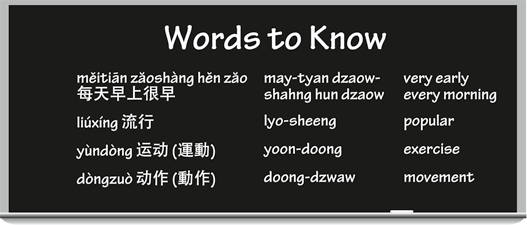Chinese For Dummies (89 page)
Read Chinese For Dummies Online
Authors: Wendy Abraham
 NÇ huì búhuì dÇ tà ijÃquán?
NÇ huì búhuì dÇ tà ijÃquán?
ä½ ä¼ä¸ä¼æ太ææ³
? (
ä½ æä¸ææ太極æ³
?) (nee hway boo-hway dah tye-jee-chwahn?) (
Do you know how to do Tai Ji?
)
 NÇ dÇ májià ng ma?
NÇ dÇ májià ng ma?
ä½ æ麻å°å
? (
ä½ æ麻å°å
?) (nee dah mah-jyahng mah?) (
Do you play mah-jong?
)
 Both
Both
tà ijÃquán
and
májià ng
are quintessential Chinese pastimes. In addition to
tà ijÃquán,
everyone is familiar with other forms of
wÇshù
æ¦æ¯
(
æ¦è¡
)
(woo-shoo) (
martial arts
), including
kung fu
å夫
â a martial art practiced since the
Tang
å
(tahng) dynasty back in the 8th century. In fact, you can still see
kung fu
masters practicing at the Shaolin Temple in Zhengzhou, Henan Province â one great reason for making a trip off the beaten path if you ever visit China.
 Tà ijÃquán
Tà ijÃquán
is considered an internal martial art and is the most widely practiced form of martial arts throughout the world. The term
tà ijÃ
(
the Great Ultimate
) refers to the interplay between opposing yet complementary forces in the universe â yin and yang â as the basis of creation.
Quán
means
fist,
emphasizing that this art is a kind of unarmed combat. Very early every morning in China, tons of people flock to local parks to practice this slow-motion form of exercise together.
Talkin' the Talk
Donald and Helga discuss their knowledge of
taijiquan
with each other.
Donald:
NÇ huì búhuì dÇ tà ijÃquán?
nee hway boo-hway dah tye-jee-chwan?
Do you know how to do Tai Ji?
Helga:
Búhuì. KÄshì wÇ zhÄ«dà o tà ijÃquán shì yì zhÇng hÄn liúxÃng de jià nshÄn yùndòng.
boo-hway. kuh-shir waw jir-daow tye-jee-chwan shir ee joong hun lyo-sheeng duh jyan-shun yoon-doong.
No, but I know that Tai Ji is a very popular kind of exercise.
Donald:
Duìle. MÄitiÄn zÇoshà ng hÄn zÇo hÄn duÅ rén yìqÇ dÇ tà ijÃquán.
dway-luh. may-tyan dzaow-shahng hun dzaow hun dwaw run ee-chee dah tye-jee-chwan.
That's right. Very early every morning, lots of people practice Tai Ji together.
Helga:
Tà ijÃquán de dòngzuò kà nqÇlái hÄn mà n.
tye-jee-chwan duh doong-dzwaw kahn-chee-lye hun mahn.
Tai Ji movements look very slow.
Donald:
Yòu shuÅ duìle! ShÄntÇ zÇngshì yà o wÄndìng. Dòngzuò zÇngshì yà o xiétiáo.
yo shwaw dway-luh! shun-tee dzoong-shir yaow one-deeng. doong-dzwaw dzoong-shir yaow shyeh-tyaow.
Right again! The body should always be stable, and the movements should always be well coordinated.

Exploring Nature
If you're working overseas in China and want to get really far from the madding crowds, or even just far enough away from your
bà ngÅngshì
åå
¬å®¤
(
辦å
¬å®¤
) (bahn-goong-shir) (
office
) to feel refreshed, try going to one of China's many sacred mountains or a beautiful beach to take in the
shÄnshuÇ
山水
(shahn-shway) (
landscape
). You may want to
qù lùyÃng
å»é²è¥
(
å»é²ç
) (chyew lyew-eeng) (
go camping
) or set up camp on the beach and have a
yÄcÄn
éé¤
(yeh-tsahn) (
picnic
) before you
pá shÄn
ç¬å±±
(pah shahn) (
climb a mountain
).
 Traveling through the Chinese countryside is a great way to escape city life. Check out these sights along the way:
Traveling through the Chinese countryside is a great way to escape city life. Check out these sights along the way:
 bÇotÇ
bÇotÇ
å®å¡
(
寶å¡
) (baow-tah) (
pagoda
)
 dà omià o
dà omià o
éåº
(
éå»
) (daow-meow) (
Daoist temple
)
 dà otián
dà otián
稻ç°
(daow-tyan) (
rice paddies
)
 fómià o
fómià o
ä½åº
(
ä½å»
)
(faw-meow) (
Buddhist temple
)